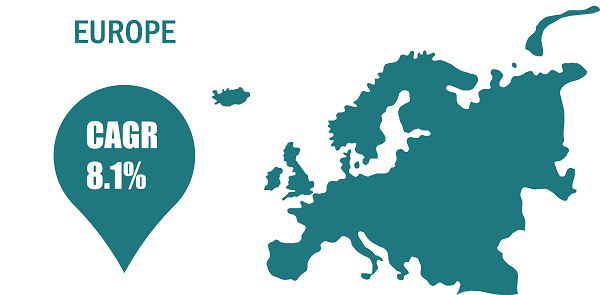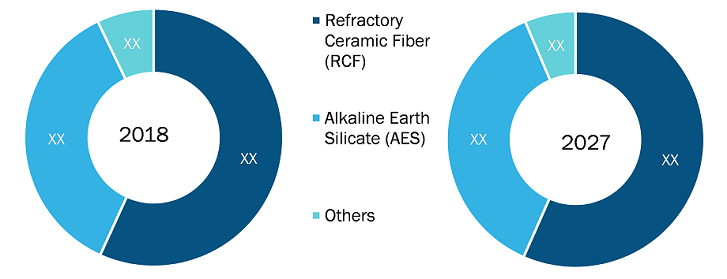The Europe ceramic fiber market is accounted to US$ 385.8 Mn in 2018 and is expected to grow at a CAGR of 8.1% during the forecast period 2019 – 2027, to account for US$ 764.6 Mn by 2027.
Ceramic fiber is a small-dimension filament or thread, which is composed of a ceramic material, primarily alumina and silica. It is used in lightweight units for electrical, sound, and thermal insulation. Most ceramic fibers contain an equal proportion of alumina and silica. Some nonoxide specialty fibers, such as silicon nitride, silicon carbide, and boron nitride, have also been produced.
Germany is dominating the Europe ceramic fiber market, followed by France. Germany has a remarkable presence in several leading automotive manufacturers such as Audi, BMW, Ford-Werke GmbH, Mercedes-Benz, Porsche, and Volkswagen, among others. Also, the presence of various other manufacturing industries, including steel and power generation, are heavily adopting advanced materials for insulation, thereby driving the ceramic fiber market in the country. Non-oxide ceramic fibers, also known as silicon carbide fibers, are used in SiC-fiber-reinforced composite materials. Fiber-reinforced composite materials uniquely combine important characteristics such as high-temperature resistance, mechanical strength, and high resistance against acids or salts. Many industries, such as aviation, rely on this high-performance material. This composite material enables more efficient turbines for airplanes that will meet the future regulatory limits for emissions.
Europe Ceramic Fiber Market

- This FREE sample will include data analysis, ranging from market trends to estimates and forecasts.
Market Insights
Higher Thermal Efficiency in Comparison to Substitutes
Along with the significant characteristics of ceramic fiber such as lower heat storage, lightweight, chemical resistance, thermal shock resistance, lower thermal conductivity and others, one of the significant characteristics of ceramic fiber is its thermal efficiency. The low thermal efficiency of ceramic fiber can be expertly made use of by the reduced furnace volume and lesser lining thickness of the furnace. The wick response of ceramic fiber lined furnace assists in more accurate control and uniform temperature distribution in the furnace. Ceramic fiber is used as a thermal insulator owing to its low thermal conductivity and poor conduction of heat. Thermal insulators are used in construction and manufacturing processes that help in the prevention of heat loss or heat gain. It helps to prevent the condensation on a cold surface and the resulting corrosion caused by it. The ceramic fibers fall in the class of high-temperature insulators, which are typically used in furnaces and super-heated systems. Thus these factors and the properties of ceramic fiber are bound to boost the ceramic fiber market all over the globe.
Type Insights
Based on type, the Europe ceramic fiber market is bifurcated as Refractory Ceramic Fiber (RCF), Alkaline Earth Silicate (AES) wool, and others. The RCF segment dominated the Europe ceramic fiber market. RCFs are manufactured when raw materials such as kaolin clay, Al2O3, SiO2, and ZrO2 are melted together, followed by the process of spinning or blowing into alumino-silicate fibers. These fibers vary from natural mineral fibers asbestos and can be converted into crystalline silica (cristobalite). RCFs are considered as amorphous fibers that belong to a class of materials termed synthetic vitreous fibers (SVFs), also called synthetic mineral fibers (SMFs), man-made mineral fibers (MMMFs), or man-made vitreous fibers (MMVFs). Raw refractory ceramic fibers are present in white or gray color fibrous materials in the form of bulk fiber or blanket form, amongst others.
Product Form Insights
Based on product form, the Europe ceramic fiber market is bifurcated as blanket, module, board, paper and others. The blanket segment dominated the Europe ceramic fiber market. Blankets made up of ceramic fiber are available in three standard grades, namely commercial, high-purity, and zirconia. These blankets are manufactured in varying dimensions, temperature ratings, and for different applications. The demand for ceramic fiber blankets is high from among various end use industries such as metallurgy, power, and petrochemical industries as it offers protection against direct exposure to flames.
End Use Industry Insights
The Europe Ceramic fiber market is bifurcated based on end use industry into iron and steel, refining and petrochemical, power generation, aluminum and others. The refining and petrochemical segment accounted for the largest share in the Europe ceramic fiber market. Ceramic fibers possess several properties, such as lightweight, resistance to thermal shock, chemical & corrosion, low thermal conductivity, and high-temperature stability. Also, low operational costs, high reliability, and less energy requirement associated with the use of ceramic fiber in furnace linings, roofs, and walls are boosting its usage across the refining and petrochemical industry.
Europe Ceramic Fiber Market by Type

- This FREE sample will include data analysis, ranging from market trends to estimates and forecasts.
EUROPE CERAMIC FIBER MARKET SEGMENTATION
Europe Ceramic Fiber Market – By Type
- Refractory Ceramic Fiber (RCF)
- Alkaline Earth Silicate (AES) Wool
- Others
Europe Ceramic Fiber Market – By Product Form
- Blanket
- Module
- Board
- Paper
- Others
Europe Ceramic Fiber Market – By End Use Industry
- Iron and Steel
- Refining and Petrochemical
- Power Generation
- Aluminum
- Others
Europe Ceramic Fiber Market – By Country
- Germany
- France
- Italy
- UK
- Russia
- Rest of Europe
Company Profiles
- Great Lakes Textiles
- HarbisonWalker International, Inc.
- 3M
- Lewco Specialty Products, Inc.
- Luyang Energy-Saving Materials Co., Ltd.
- Morgan Advanced Materials
- Nutec Group
- Pyrotek Inc.
- Rath-Group
Europe Ceramic Fiber Report Scope
| Report Attribute | Details |
|---|---|
| Market size in 2018 | US$ 385.8 Million |
| Market Size by 2027 | US$ 764.6 Million |
| CAGR (2019 - 2027) | 8.1% |
| Historical Data | 2016-2017 |
| Forecast period | 2019-2027 |
| Segments Covered |
By Type
|
| Regions and Countries Covered |
Europe
|
| Market leaders and key company profiles |
|
- Historical Analysis (2 Years), Base Year, Forecast (7 Years) with CAGR
- PEST and SWOT Analysis
- Market Size Value / Volume - Regional, Country
- Industry and Competitive Landscape
- Excel Dataset
Recent Reports
Testimonials
Reason to Buy
- Informed Decision-Making
- Understanding Market Dynamics
- Competitive Analysis
- Identifying Emerging Markets
- Customer Insights
- Market Forecasts
- Risk Mitigation
- Boosting Operational Efficiency
- Strategic Planning
- Investment Justification
- Tracking Industry Innovations
- Aligning with Regulatory Trends






















 Get Free Sample For
Get Free Sample For